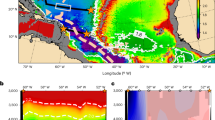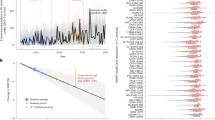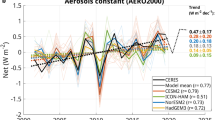Abstract
Atlantic hurricane activity has increased significantly since 1995 (refs 1–4), but the underlying causes of this increase remain uncertain2,5,6,7,8,9,10,11,12,13,14,15. It is widely thought that rising Atlantic sea surface temperatures have had a role in this16,17, but the magnitude of this contribution is not known. Here we quantify this contribution for storms that formed in the tropical North Atlantic, Caribbean Sea and Gulf of Mexico; these regions together account for most of the hurricanes that make landfall in the United States. We show that a statistical model based on two environmental variables—local sea surface temperature and an atmospheric wind field—can replicate a large proportion of the variance in tropical Atlantic hurricane frequency and activity between 1965 and 2005. We then remove the influence of the atmospheric wind field to assess the contribution of sea surface temperature. Our results indicate that the sensitivity of tropical Atlantic hurricane activity to August–September sea surface temperature over the period we consider is such that a 0.5 °C increase in sea surface temperature is associated with a ∼40% increase in hurricane frequency and activity. The results also indicate that local sea surface warming was responsible for ∼40% of the increase in hurricane activity relative to the 1950–2000 average between 1996 and 2005. Our analysis does not identify whether warming induced by greenhouse gases contributed to the increase in hurricane activity, but the ability of climate models to reproduce the observed relationship between hurricanes and sea surface temperature will serve as a useful means of assessing whether they are likely to provide reliable projections of future changes in Atlantic hurricane activity.
This is a preview of subscription content, access via your institution
Access options
Subscribe to this journal
Receive 51 print issues and online access
$199.00 per year
only $3.90 per issue
Buy this article
- Purchase on Springer Link
- Instant access to full article PDF
Prices may be subject to local taxes which are calculated during checkout



Similar content being viewed by others
References
Trenberth, K. E. Uncertainty in hurricanes and global warming. Science 308, 1753–1754 (2005)
Emanuel, K. A. Increasing destructiveness of tropical cyclones over the past 30 years. Nature 436, 686–688 (2005)
Landsea, C. W. Hurricanes and global warming. Nature 438, E11–E13 (2005)
Bell, G. D. et al. The record breaking 2005 Atlantic hurricane season. Bull. Am. Meteorol. Soc. 87, S44–S45 (2006)
Goldenberg, S. B., Landsea, C. W., Mestas-Nunez, A. M. & Gray, W. M. The recent increase in Atlantic hurricane activity: causes and implications. Science 293, 474–479 (2001)
Webster, P. J., Holland, G. J., Curry, J. A. & Chang, H.-R. Changes in tropical cyclone number, duration and intensity in a warming environment. Science 309, 1844–1846 (2005)
Emanuel, K. A. Emanuel replies. Nature 438, E13 (2005)
Bell, G. D. & Chelliah, M. Leading tropical modes associated with interannual and multidecadal fluctuations in North Atlantic hurricane activity. J. Clim. 19, 590–612 (2006)
Hoyos, C. D., Agudelo, P. A., Webster, P. J. & Curry, J. A. Deconvolution of the factors contributing to the increase in global hurricane intensity. Science 312, 94–97 (2006)
Trenberth, K. E. & Shea, D. J. Atlantic hurricanes and natural variability in 2005. Geophys. Res. Lett. 33 L12704 10.1029/2006GL026894 (2006)
Mann, M. E. & Emanuel, K. A. Atlantic hurricane trends linked to climate change. Eos 87, 233–244 (2006)
Elsner, J. B. Evidence in support of the climate change–Atlantic hurricane hypothesis. Geophys. Res. Lett. 33 L16705 10.1029/2006GL026869 (2006)
Klotzbach, P. J. & Gray, W. M. Causes of the unusually destructive 2004 Atlantic basin hurricane season. Bull. Am. Meteorol. Soc. 87, 1325–1333 (2006)
Vimont, D. J. & Kossin, J. P. The Atlantic meridional mode and hurricane activity. Geophys. Res. Lett. 34 L07709 10.1029/2007GL029683 (2007)
Holland, G. J. & Webster, P. J. Heightened tropical cyclone activity in the North Atlantic: Natural variability or climate trend? Phil. Trans. R. Soc. A 365, 2695–2716 (2007)
Nature editorial. The gathering storm. Nature 441, 549 (2006)
IPCC. Climate Change 2007: The Physical Science Basis. Summary for Policymakers 〈http://www.ipcc.ch〉 (IPCC Secretariat, World Meteorological Organization, Geneva, 2007)
Waple, A. M. et al. Climate assessment for 2001. Bull. Am. Meteorol. Soc 83, S1–S62 (2001)
McDonald, R. E., Bleaken, D. G., Cresswell, D. R., Pope, V. D. & Senior, C. A. Tropical storms: representation and diagnosis in climate models and the impacts of climate change. Clim. Dyn. 25, 19–36 (2005)
Bengtsson, L., Hodges, K. I. & Roeckner, E. Storm tracks and climate change. J. Clim. 19, 3518–3543 (2006)
Oouchi, K. et al. Tropical cyclone climatology in a global-warming climate as simulated in a 20km-mesh global atmospheric model: frequency and wind intensity analysis. J. Meteorol. Soc. Jpn 84, 259–276 (2006)
Knutson, T. R., Sirutis, J. J., Garner, S. T., Held, I. M. & Tuleya, R. E. Simulation of the recent multi-decadal increase of Atlantic hurricane activity using an 18-km grid regional model. Bull. Am. Meteorol. Soc. 88, 1549–1565 (2007)
Neumann, C. J., Jarvinen, B. R., McAdie, C. J. & Hammer, G. R. Tropical Cyclones of the North Atlantic Ocean 1871–1998 (Historical Climatology Series 6-2, National Oceanic and Atmospheric Administration, Asheville, NC, 1999)
Kalnay, E. et al. The NCEP/NCAR 40-year reanalysis. Bull. Am. Meteorol. Soc. 77, 437–471 (1996)
Landsea, C. W. Counting Atlantic tropical cyclones back to 1900. Eos 88, 197–202 (2007)
Goldenberg, S. B. & Shapiro, L. J. Physical mechanisms for the association of El Niño and west African rainfall with Atlantic major hurricane activity. J. Clim. 9, 1169–1187 (1996)
Wilks, D. S. Statistical Methods in the Atmospheric Sciences 2nd edn (Academic, San Diego, 2006)
Kleinbaum, D. G., Kupper, L. L. & Muller, K. E. Applied Regression Analysis and Other Multivariable Methods 2nd edn (Duxbury Press, Belmont, CA, 1988)
Saunders, M. A. & Lea, A. S. Seasonal prediction of hurricane activity reaching the coast of the United States. Nature 434, 1005–1008 (2005)
Elsner, J. B. & Schmertmann, C. P. Assessing forecast skill through cross-validation. Weath. Forecasting 9, 619–624 (1994)
Saunders, M. A. & Harris, A. R. Statistical evidence links exceptional 1995 Atlantic hurricane season to record sea warming. Geophys. Res. Lett. 24, 1255–1258 (1997)
Acknowledgements
We thank J. B. Elsner for helpful comments on the manuscript. This work is supported by the TSR (Tropical Storm Risk) venture sponsored by Benfield (an independent reinsurance intermediary), Royal & SunAlliance (an insurance group), and Crawford & Company (a claims management solutions company). We acknowledge NOAA-CIRES, Climate Diagnostics Center, for the NCEP/NCAR Global Reanalysis Project data and NOAA’s Hurricane Research Division for the HURDAT North Atlantic hurricane database.
Author Contributions M.A.S. instigated and directed the research and wrote the manuscript. A.S.L. performed the data analysis and contributed ideas.
Author information
Authors and Affiliations
Corresponding author
Supplementary information
Supplementary Information
The file contains Supplementary Figure 1 with Legend and Supplementary Discussion. The Supplementary Figure 1 shows the sensitivity of North Atlantic basin hurricane activity and frequency to increasing sea surface temperatures in the tropical North Atlantic after removing the influence of atmosphere wind circulation. (PDF 209 kb)
Rights and permissions
About this article
Cite this article
Saunders, M., Lea, A. Large contribution of sea surface warming to recent increase in Atlantic hurricane activity. Nature 451, 557–560 (2008). https://doi.org/10.1038/nature06422
Received:
Accepted:
Issue Date:
DOI: https://doi.org/10.1038/nature06422
This article is cited by
-
Temporal evolution of hurricane activity: insights from decades of category 1–5 analysis
Environmental Earth Sciences (2024)
-
Trophic state resilience to hurricane disturbance of Lake Yojoa, Honduras
Scientific Reports (2023)
-
On the recent increase in Atlantic Ocean hurricane activity and influencing factors
Natural Hazards (2023)
-
Climate Change Driving Widespread Loss of Coastal Forested Wetlands Throughout the North American Coastal Plain
Ecosystems (2022)
-
Recent Decrease in the Difference in Tropical Cyclone Occurrence between the Atlantic and the Western North Pacific
Advances in Atmospheric Sciences (2022)
Comments
By submitting a comment you agree to abide by our Terms and Community Guidelines. If you find something abusive or that does not comply with our terms or guidelines please flag it as inappropriate.



